Useful life hacking: answering the most popular questions
It’s not a secret for us that many professionals working with Huawei network equipment have a number of questions for us.
We also know that some of these specialists were not shy about expressions in the process of setting up Huawei products. And we are sure that this post will answer both the most questions of those who are just starting to work with network equipment of our company, and those who already have considerable experience in projects using it. In addition, the article is recommended for reading to all professionals who admit the possibility of interaction with Huawei communication equipment.
The fact is that almost all the questions coming to us from users are quite similar and standard, despite their number. Therefore, in order to make your life easier, we tried to create for you a set of "life hacking" that will solve a significant part of the problems associated with the operation of our equipment.
Before we begin, we want to warn you that in order to access some of the useful content in question, you will need to go through a simple registration on the Huawei portal .
')
Now that all the foreplay is over, go to the main point.
Yes Yes exactly! Answers to most of the asked questions can be obtained without much effort from the documents available on the company’s portal.
You can argue, they say, "there is a perception that there is no public documentation for Huawei equipment in public access - and in general, there are doubts that such exists in nature."
The answer is a myth. Of course, it did not originate from scratch, and several years ago, when the Huawei Enterprise division was created, most of the materials and documentation were indeed “Internal”, and the company's portal was not rich in publicly available materials. However, times are changing, the company's processes are changing with them, and at the moment the support portal offers users a huge amount of various documentation for Huawei equipment.
Of course, a large amount of documentation is fraught with another problem for specialists - the problem of time-consuming search for the necessary information to solve their problems. Often, experts are afraid to "drown" in a sea of instructions, documents and specifications. This problem is relevant both for the designer who is engaged in choosing equipment models and planning its placement in racks, and for a system administrator or maintenance specialist who is engaged in setting up the network and trying to figure out why the indicator on the board is flashing green twice a second.
We tried to solve this problem. On the “territory of Huawei” you can safely forget about the “information digs” - here you will need only one document issued for the line of equipment for a specific software version. The availability of new versions is automatically monitored, for this you only need to have an account on our support site.
For an example, take a look at the document on the AR G3 series of V200R008 routers - "Huawei AR120 & AR150 & AR160 & AR200 & AR500 & AR510 & AR1200 & AR2200 & AR3200 & AR3600 Product Documentation".
Finding such documents will not be difficult - select the product of interest in the support section and apply a filter by the category “Product Documentation”:
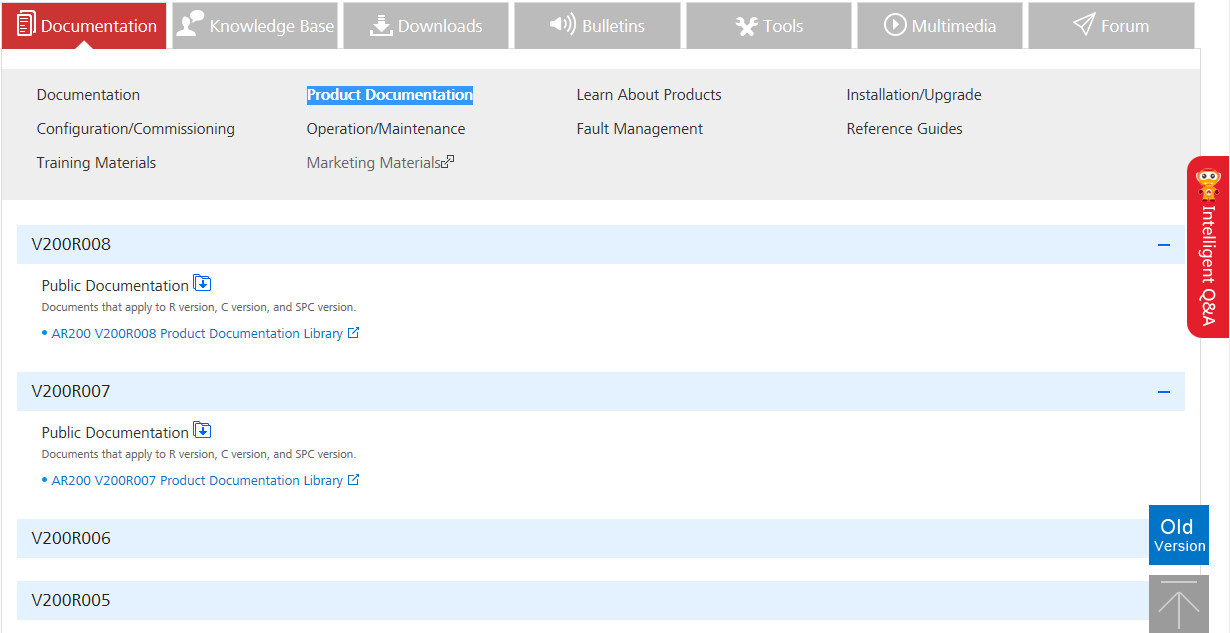
So, you have found the document you need, but this is not all amenity!
Please note that when you open the corresponding library in the online browsing mode, at the top of the page there are links to download this library, as well as the HedexLite program to view it:
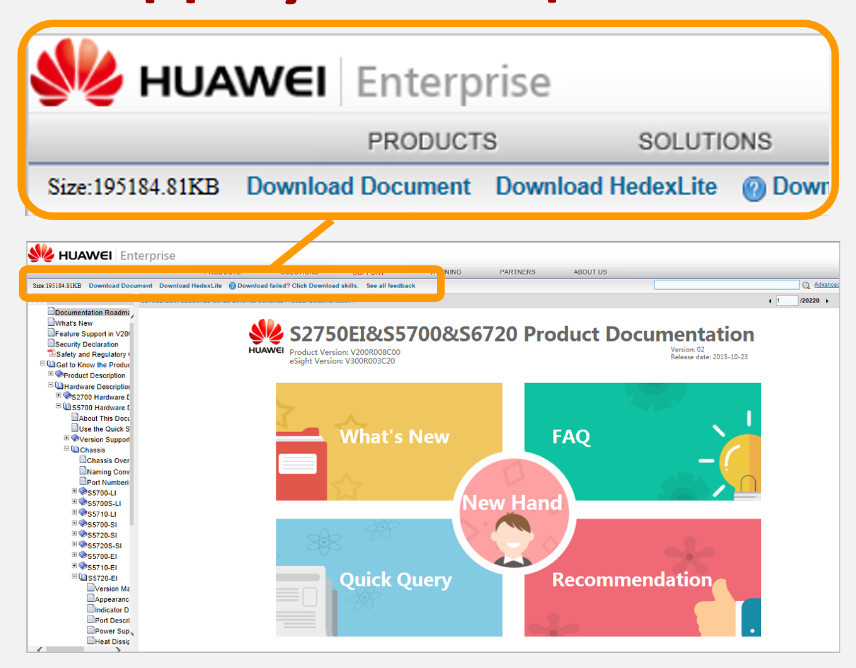
This documentation contains a huge amount of conveniently grouped information, which is provided with cross-references for ease of use:
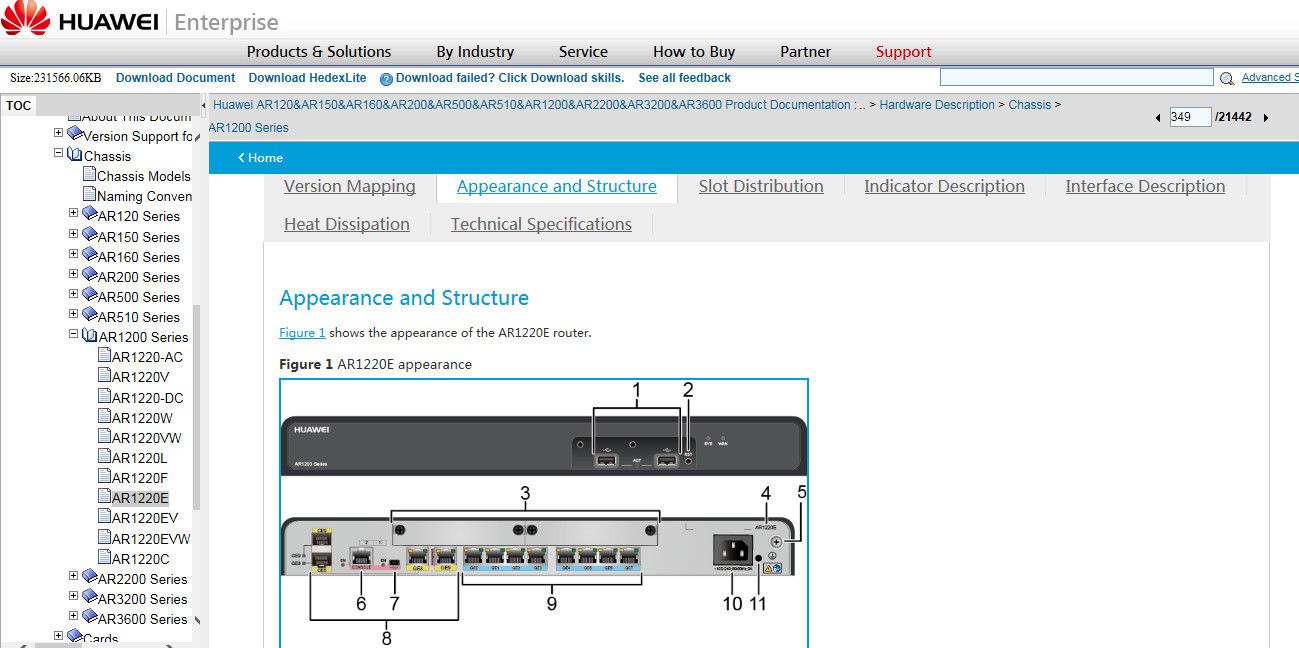
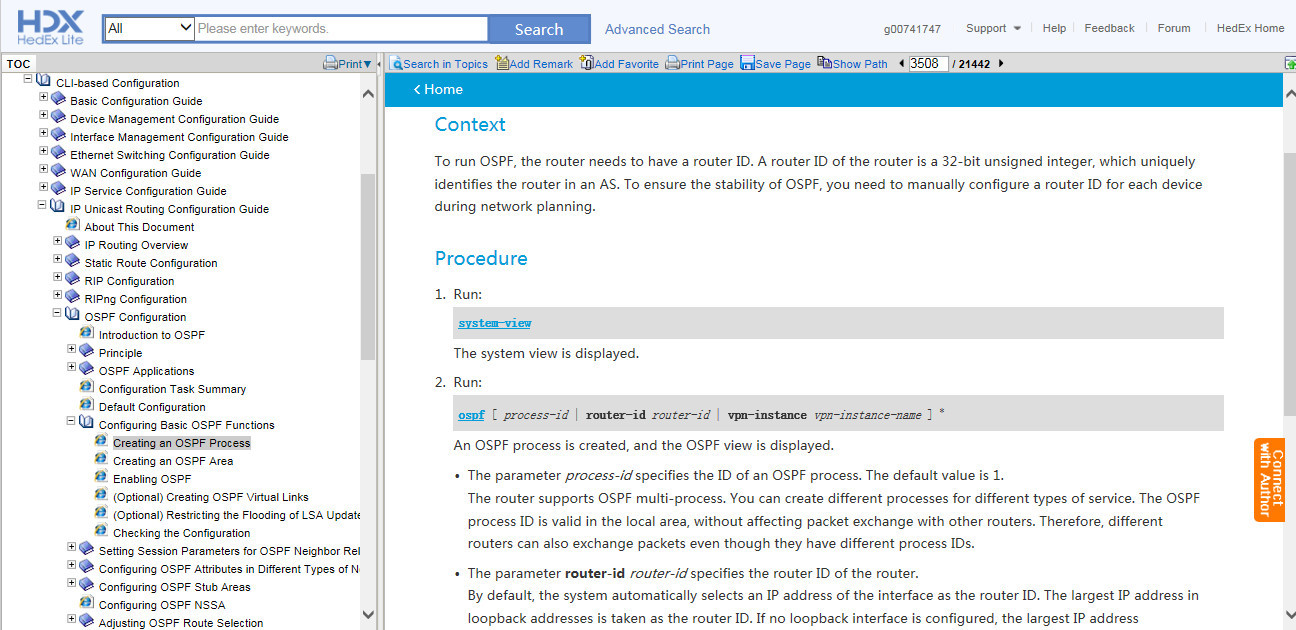
At the end of each section there is a collection of typical configuration examples, where a set of typical topologies with an example of interfaces is presented. It also provides instructions on how to configure all devices on the topology, taking into account interfaces and IP addresses, commands for intermediate validation of settings and the resulting fragments of the configuration file. In addition, in addition to this, typical configuration errors are provided that allow users with tips and concrete solutions on how to find and fix the problem.
Download HedexLite, you get a number of additional useful features, such as:

The ability to download a separate PDF document from the site has also not gone away.
In addition, you can download the MIB Reference, the MIBs themselves, software images (with upgrade instructions) and patches.
This life hack is for those who want to get acquainted with the command line of Huawei equipment, prepare for certification exams or build some kind of virtual network topology for other tasks.
All registered users on the Huawei support site can access the Huawei equipment emulator called eNSP, the latest version of which can also be downloaded from our support portal.
To create virtual topologies, ARG3 series routers, Sx700 and CloudEngine series switches, Wi-Fi controller and access points, ITU USG and a number of auxiliary tools (PC, server, mobile client) are available. Modular routers (AR1200-3200) can be completed with model boards - their number in the emulator is much less than is available to order, but it is quite possible to emulate the most common communication lines FE / GE / G.SHDSL / Serial.
The command line of devices corresponds to real models, while it is possible to run Wireshark on virtual interfaces if you are preparing for the exam and want to study the structure of service packets of routing protocols.
Hardware emulation uses built-in VRP images. And for topologies with a large number of devices (and therefore high requirements for the amount of RAM and processor resources), the client-server mode is provided when virtual devices are launched on a remote server, removing heavy computing tasks from your PC.
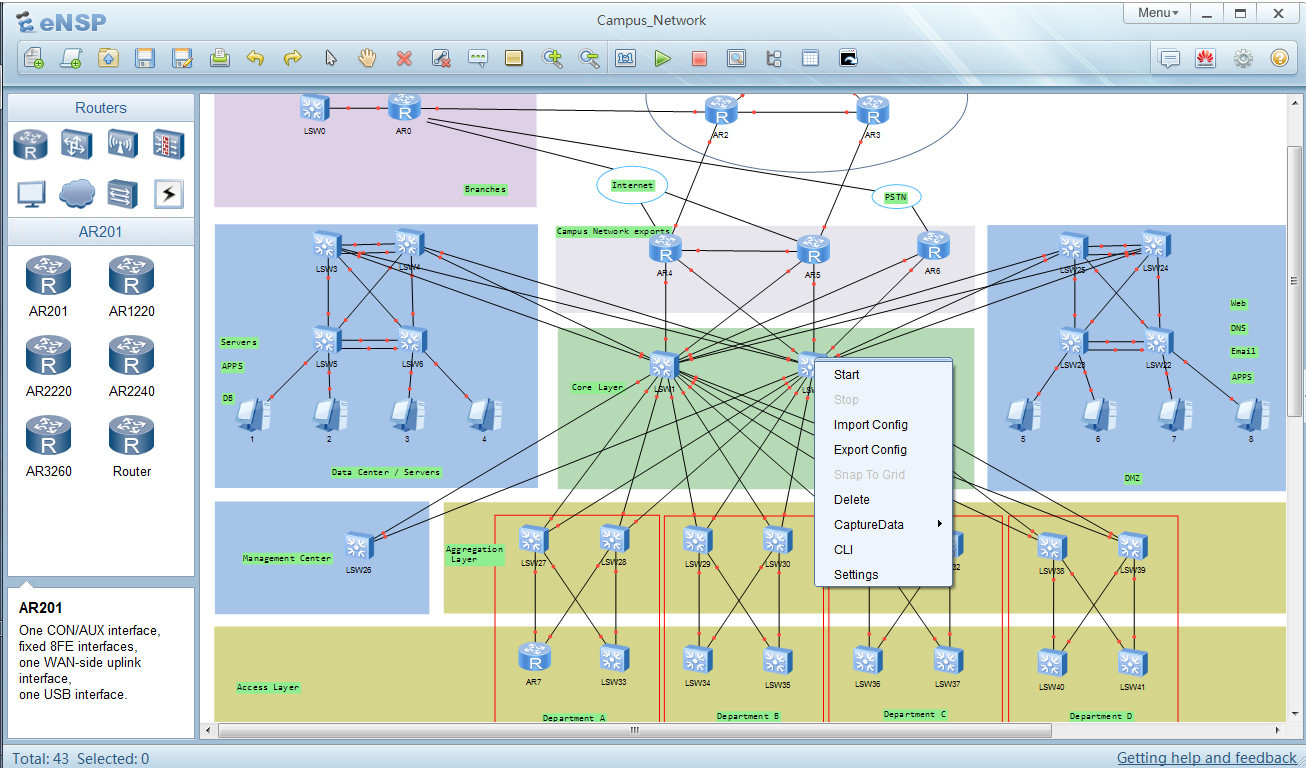
In the working area for the convenience and simplicity of perception of the topology, you can change the colors of backgrounds, sign devices and their groups.
It should be noted - to work with the emulator requires Oracle VM VirtualBox (included in the installation package).
In the future, checking for updated versions of the emulator program is performed automatically.
The next life hack is a great gift from Huawei! After all, it will be useful not only to professionals working with Huawei equipment, but also to all those who have (and have to) be engaged in the preparation of project documentation or, in extreme cases, the creation of a high-level network diagram.
Regardless of which equipment is used by manufacturers in your projects - our stencils for MS Visio will delight all authors of project documentation and network diagrams.
Everything on the same support portal (where the concentration of utility per square centimeter just rolls over :) you are expected by two options of “stencils” :
From them it is possible to assemble the rack facade with the equipment necessary in the project:
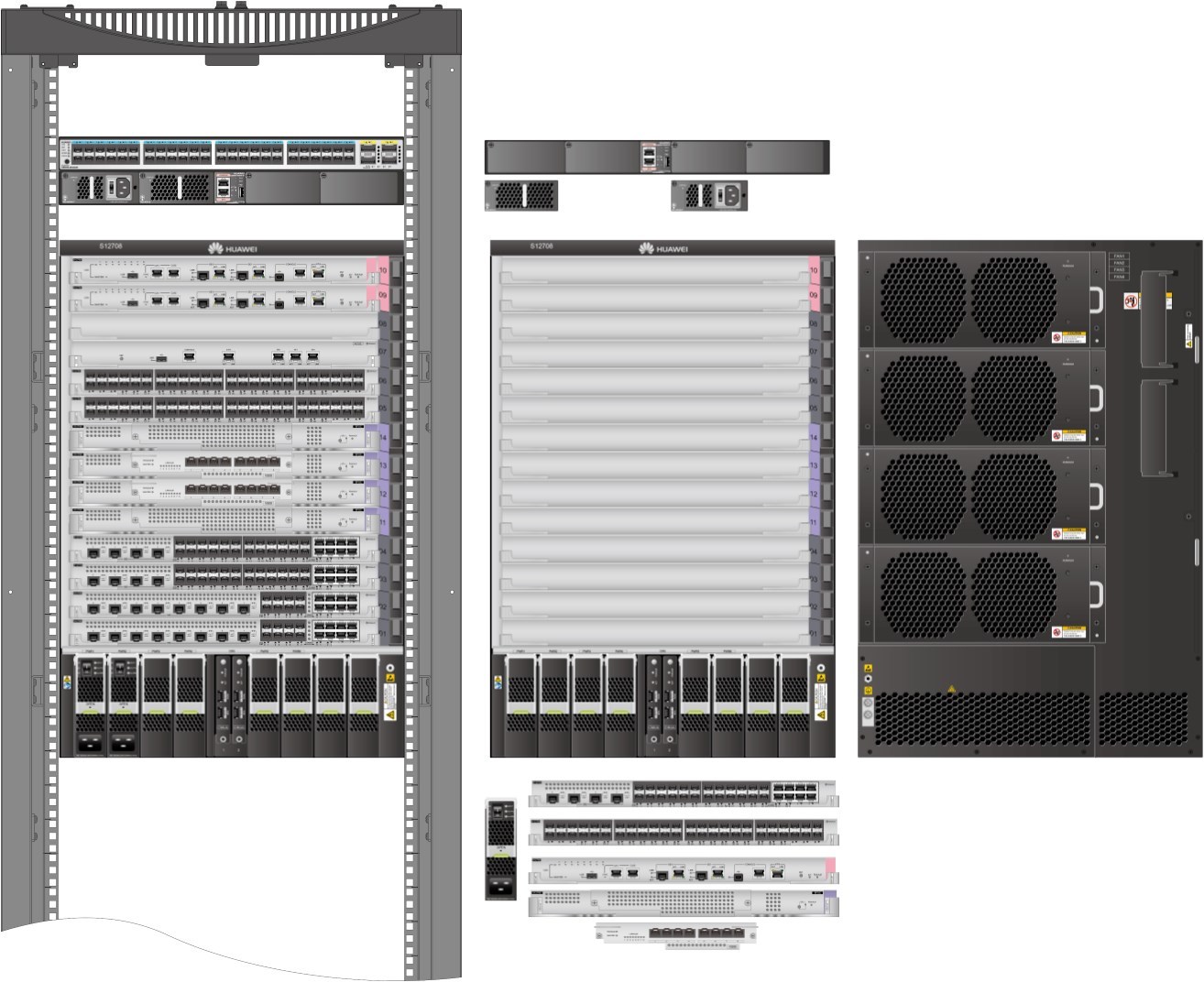
The trend of migration of traditional software and utilities from stationary PCs to Internet portals has long been no secret to anyone: Google Docs / Sheets, graphic editors, and more.
And we believe in the prospects for the development of “online tools”, in the convenience of their use, and therefore we strive to develop and fill the Huawei support portal.
In addition to the tools that we described above, on our support portal you can find a number of other useful “online tools”. And there you can find answers to a large number of your questions.
And most importantly: feel free to ask your questions to us - it is your needs that help us in implementing new ideas on how to make it easier and more convenient for you to work with Huawei network equipment.
Do not stay "alone" with your problems :)
We also know that some of these specialists were not shy about expressions in the process of setting up Huawei products. And we are sure that this post will answer both the most questions of those who are just starting to work with network equipment of our company, and those who already have considerable experience in projects using it. In addition, the article is recommended for reading to all professionals who admit the possibility of interaction with Huawei communication equipment.
The fact is that almost all the questions coming to us from users are quite similar and standard, despite their number. Therefore, in order to make your life easier, we tried to create for you a set of "life hacking" that will solve a significant part of the problems associated with the operation of our equipment.
Before we begin, we want to warn you that in order to access some of the useful content in question, you will need to go through a simple registration on the Huawei portal .
')
Now that all the foreplay is over, go to the main point.
Life hacking number one: Read the documentation!
Yes Yes exactly! Answers to most of the asked questions can be obtained without much effort from the documents available on the company’s portal.
You can argue, they say, "there is a perception that there is no public documentation for Huawei equipment in public access - and in general, there are doubts that such exists in nature."
The answer is a myth. Of course, it did not originate from scratch, and several years ago, when the Huawei Enterprise division was created, most of the materials and documentation were indeed “Internal”, and the company's portal was not rich in publicly available materials. However, times are changing, the company's processes are changing with them, and at the moment the support portal offers users a huge amount of various documentation for Huawei equipment.
Of course, a large amount of documentation is fraught with another problem for specialists - the problem of time-consuming search for the necessary information to solve their problems. Often, experts are afraid to "drown" in a sea of instructions, documents and specifications. This problem is relevant both for the designer who is engaged in choosing equipment models and planning its placement in racks, and for a system administrator or maintenance specialist who is engaged in setting up the network and trying to figure out why the indicator on the board is flashing green twice a second.
We tried to solve this problem. On the “territory of Huawei” you can safely forget about the “information digs” - here you will need only one document issued for the line of equipment for a specific software version. The availability of new versions is automatically monitored, for this you only need to have an account on our support site.
For an example, take a look at the document on the AR G3 series of V200R008 routers - "Huawei AR120 & AR150 & AR160 & AR200 & AR500 & AR510 & AR1200 & AR2200 & AR3200 & AR3600 Product Documentation".
Finding such documents will not be difficult - select the product of interest in the support section and apply a filter by the category “Product Documentation”:

Life hacking number two: HedexLite!
So, you have found the document you need, but this is not all amenity!
Please note that when you open the corresponding library in the online browsing mode, at the top of the page there are links to download this library, as well as the HedexLite program to view it:

This documentation contains a huge amount of conveniently grouped information, which is provided with cross-references for ease of use:
- List of new features in the current version with a description of the features.
- Description of the line, positioning models, typical use scenarios and so on.
- A description of the hardware platform, including:
- the appearance of each model of the router, with a description of all components (built-in ports, slots for boards and power supplies, indicators, grounding bolts, etc.);
- slot numbering rules;
- blowing scheme;
- technical characteristics (processor, memory, size, weight, power consumption, operating temperature range, etc.);
- a similar description for all boards, cables (with pinouts, if necessary), transceivers (with optical budgets), power supplies and fans.

- Installation instructions.
- Detailed instructions for setting up, divided into sections (within each section - a set of typical configuration sections with steps and links to the built-in “command reference”, which describes all possible command parameters).

At the end of each section there is a collection of typical configuration examples, where a set of typical topologies with an example of interfaces is presented. It also provides instructions on how to configure all devices on the topology, taking into account interfaces and IP addresses, commands for intermediate validation of settings and the resulting fragments of the configuration file. In addition, in addition to this, typical configuration errors are provided that allow users with tips and concrete solutions on how to find and fix the problem.
- Section "Operation and Maintenance" with a description of operating procedures (if required) and model questionnaires with commands to check the status of devices.
- A section with a description of possible accidents and the order of actions that must be performed in the event of incidents, as well as a collection of instructions for diagnosing and solving typical faults (for example, instructions for resetting the password to the console if it was lost for any reason).
- The already mentioned “command reference” with a detailed description of all possible parameters of the configuration and diagnostic commands.
Download HedexLite, you get a number of additional useful features, such as:
- download documentation from the support portal;
- checking the availability of updated documents in the library, as well as checking the presence of already irrelevant versions of documents (which can be deleted);
- flexible documentation search system, with the ability to filter search results by sections; for example, by searching for the “ospf” key message, you can filter the results by document type:

The ability to download a separate PDF document from the site has also not gone away.
In addition, you can download the MIB Reference, the MIBs themselves, software images (with upgrade instructions) and patches.
Life hacking number three: Network equipment eNSP emulator!
This life hack is for those who want to get acquainted with the command line of Huawei equipment, prepare for certification exams or build some kind of virtual network topology for other tasks.
All registered users on the Huawei support site can access the Huawei equipment emulator called eNSP, the latest version of which can also be downloaded from our support portal.
To create virtual topologies, ARG3 series routers, Sx700 and CloudEngine series switches, Wi-Fi controller and access points, ITU USG and a number of auxiliary tools (PC, server, mobile client) are available. Modular routers (AR1200-3200) can be completed with model boards - their number in the emulator is much less than is available to order, but it is quite possible to emulate the most common communication lines FE / GE / G.SHDSL / Serial.
The command line of devices corresponds to real models, while it is possible to run Wireshark on virtual interfaces if you are preparing for the exam and want to study the structure of service packets of routing protocols.
Hardware emulation uses built-in VRP images. And for topologies with a large number of devices (and therefore high requirements for the amount of RAM and processor resources), the client-server mode is provided when virtual devices are launched on a remote server, removing heavy computing tasks from your PC.

In the working area for the convenience and simplicity of perception of the topology, you can change the colors of backgrounds, sign devices and their groups.
It should be noted - to work with the emulator requires Oracle VM VirtualBox (included in the installation package).
In the future, checking for updated versions of the emulator program is performed automatically.
Life hacking number four: Stencils for Visio!
The next life hack is a great gift from Huawei! After all, it will be useful not only to professionals working with Huawei equipment, but also to all those who have (and have to) be engaged in the preparation of project documentation or, in extreme cases, the creation of a high-level network diagram.
Regardless of which equipment is used by manufacturers in your projects - our stencils for MS Visio will delight all authors of project documentation and network diagrams.
Everything on the same support portal (where the concentration of utility per square centimeter just rolls over :) you are expected by two options of “stencils” :
- Icons of network devices and auxiliary elements (in two colors) for creating network topologies and schemes for any occasion:
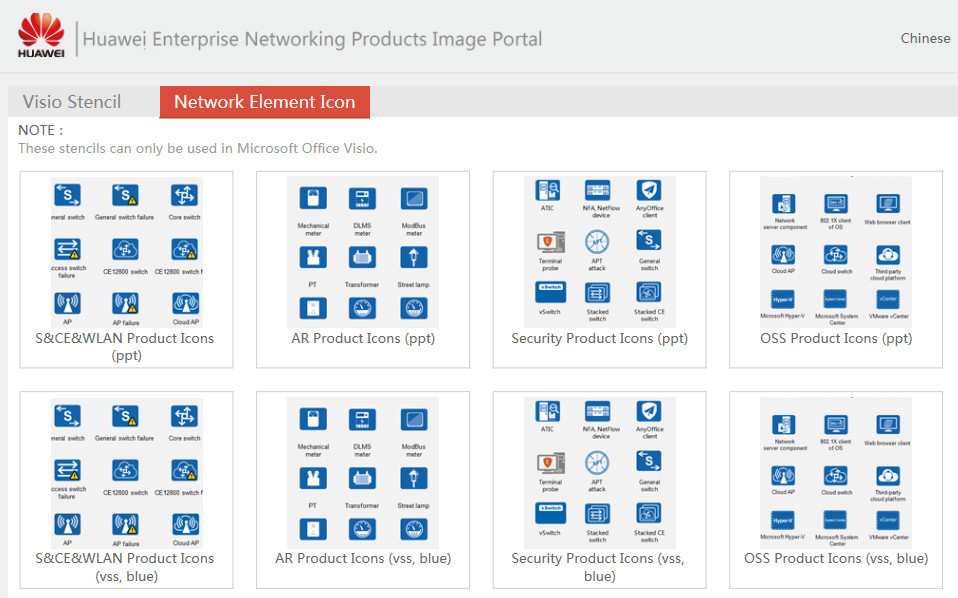
- Facades of devices with “magnetic” blocks and boards for drawing racks filling
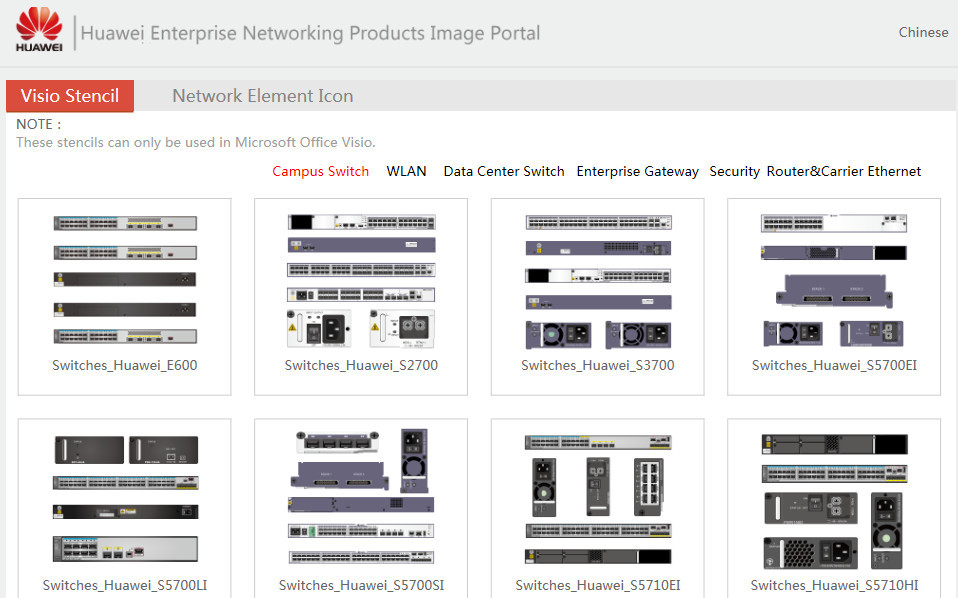
From them it is possible to assemble the rack facade with the equipment necessary in the project:

Life hacking number five: Final!
The trend of migration of traditional software and utilities from stationary PCs to Internet portals has long been no secret to anyone: Google Docs / Sheets, graphic editors, and more.
And we believe in the prospects for the development of “online tools”, in the convenience of their use, and therefore we strive to develop and fill the Huawei support portal.
In addition to the tools that we described above, on our support portal you can find a number of other useful “online tools”. And there you can find answers to a large number of your questions.
And most importantly: feel free to ask your questions to us - it is your needs that help us in implementing new ideas on how to make it easier and more convenient for you to work with Huawei network equipment.
Do not stay "alone" with your problems :)
Source: https://habr.com/ru/post/313156/
All Articles